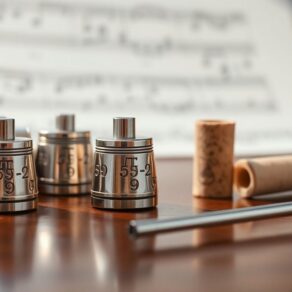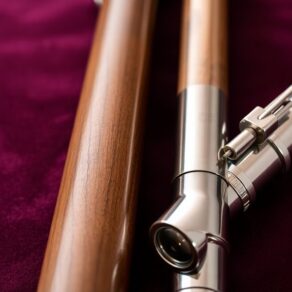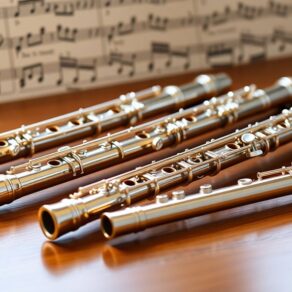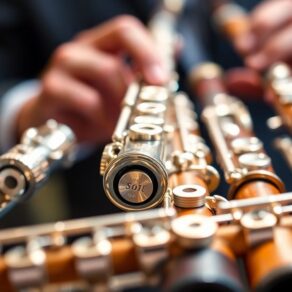To find the perfect second-hand flute, start by determining your musical needs and budget. Explore online marketplaces, local music shops, and community forums for options. When you find a flute, assess its condition by checking for scratches, dents, and pad functionality. Pay attention to the brand's reputation and the instrument's materials, as these influence sound quality. Don't forget to test the flute personally; evaluate its tone and playability. Finally, negotiate the price based on your findings. With some patience and knowledge, you can uncover an excellent flute that enhances your musical journey. More insights await you!
Understanding Flute Types
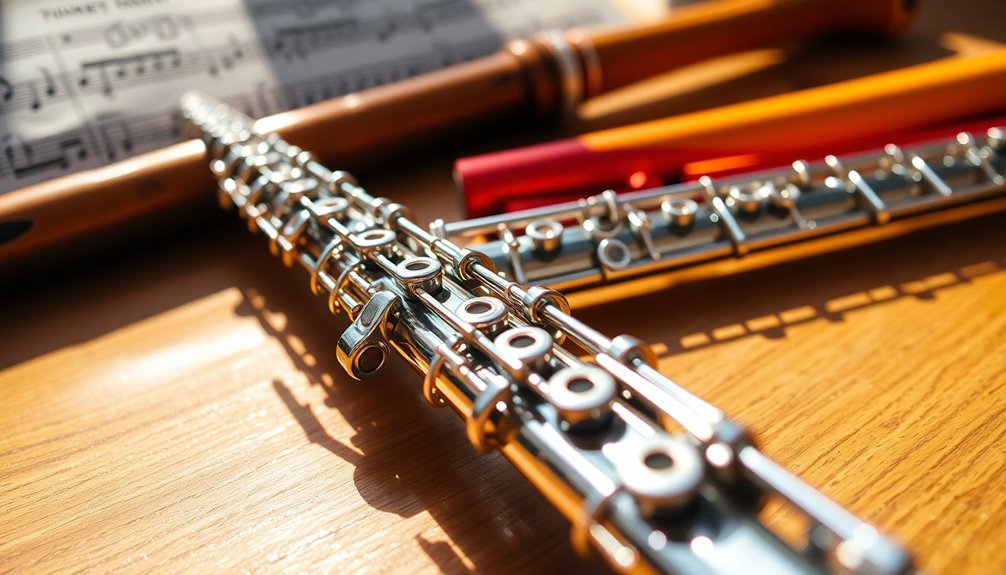
When you're diving into the world of flutes, it's essential to understand the different types available. Flutes primarily come in three categories: concert flutes, piccolos, and alto flutes. Each type offers a unique sound and playing experience, so consider what resonates with you.
Concert flutes, typically made from silver or gold, are the most common choice among beginners and professionals alike. Their rich tone and versatility allow you to explore various musical genres. Brands like Yamaha and Gemeinhardt are popular for their reliable instruments, ensuring you get quality even in the second-hand market.
Piccolos, smaller and higher-pitched, are perfect if you're looking for something to add brightness to your playing. They're often made from plastic or wood, with brands like Pearl offering excellent options. Their unique sound can help you find your niche within a community of flute players.
Alto flutes, on the other hand, provide a deeper, mellower tone. They're typically made from silver or a combination of materials, and brands such as Trevor James cater to those who want to explore this less common instrument. Many online retailers also offer a selection of best student flutes to assist in your search.
As you navigate through choices, think about the flute materials and brands that appeal to you. Finding the right type can't only enhance your playing but also connect you to a broader community of flutists.
Embrace this journey; it's about more than just the instrument—it's about belonging to a world filled with music and camaraderie.
Assessing Condition and Quality
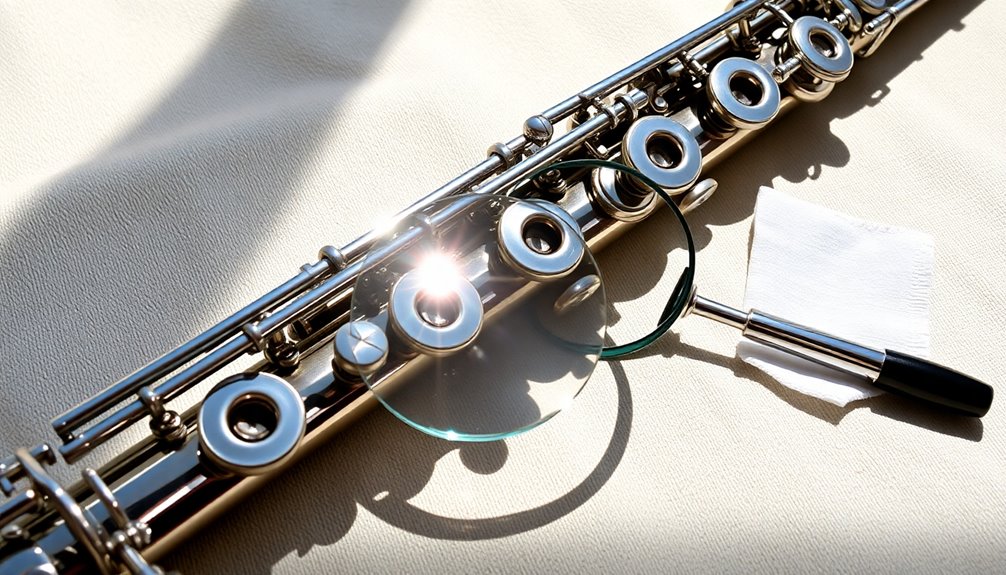
Evaluating the condition and quality of a second-hand flute is essential to guarantee you make a wise investment. You want to confirm that the instrument you choose will support your musical journey without unexpected issues. Start by checking key condition indicators, such as the pads, springs, and body. Look for signs of wear, dents, or tarnish, as these could affect performance.
To help you evaluate the flute's condition, refer to the following table:
| Condition Indicator | What to Look For | Importance |
|---|---|---|
| Pads | Are they intact and sealing properly? | Affects tone and playability |
| Springs | Do they feel responsive and not rusted? | Critical for mechanism function |
| Body | Is there any significant damage or tarnish? | Influences durability and sound quality |
When you evaluate these aspects, you're not just judging the flute's current state; you're also confirming quality assurance for your investment. A well-maintained instrument can last for years, fostering your growth as a musician. Regular cleaning with a flute cleaning kit can enhance the instrument's longevity and performance.
Don't hesitate to ask the seller about the flute's history and any repairs made. This insight can help you make a more informed decision. Remember, investing time in evaluating condition and quality now can lead to countless rewarding experiences in your musical journey. Embrace the process, and soon, you'll find a flute that feels like it was meant for you!
Key Features to Consider
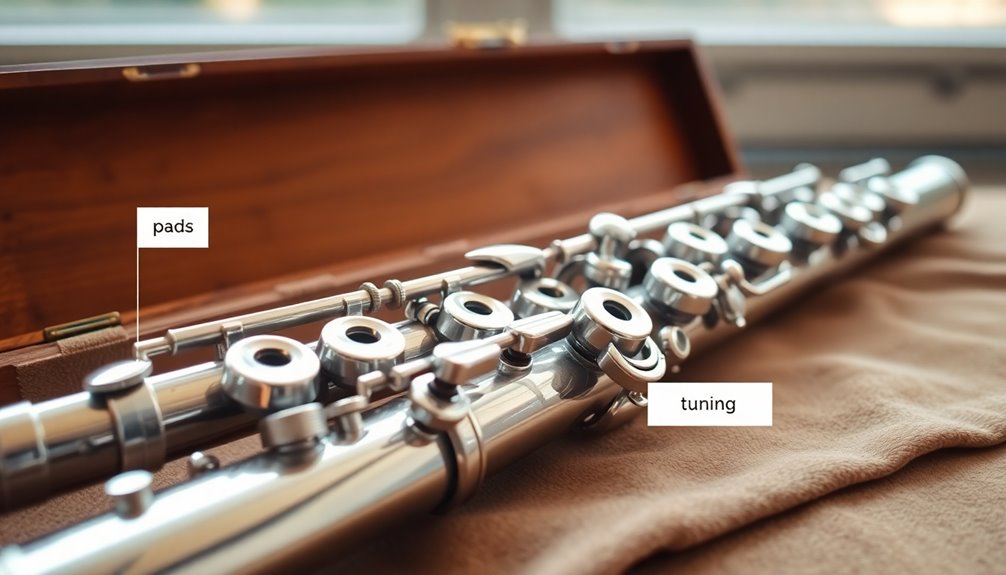
As you search for a second-hand flute, it's crucial to take into account several key features that can greatly impact your playing experience.
Understanding these features won't only help you make an informed decision but also enhance your joy in music-making.
First, consider the brand reputation. Some brands are known for their craftsmanship and durability, which can make a significant difference in sound quality and playability. Research brands that resonate with your musical style and community.
Next, focus on the material quality. Flutes can be made from various materials, such as silver, nickel, or even wood. Each material affects the tone and resonance of the flute. A well-maintained silver flute, for instance, can produce a warm, rich sound that might suit your playing preference perfectly. Additionally, flutes made from premium materials often provide enhanced tonal richness and durability, elevating your overall performance.
Finally, pay attention to the mechanics of the flute. Verify that the keys function smoothly, and check for any misalignments. A flute that feels comfortable in your hands can inspire confidence and creativity.
- The right brand can elevate your performance.
- Quality materials can transform your sound.
- Well-maintained mechanics lead to effortless playing.
Budgeting for Your Purchase
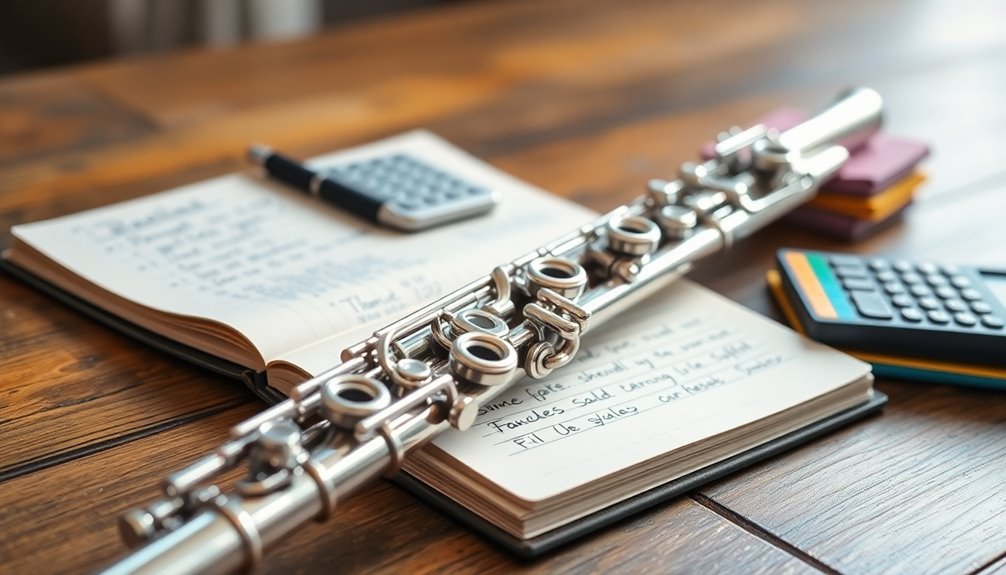
Budgeting for your purchase is essential to assure you find a second-hand flute that fits both your musical needs and financial situation. When you're exploring the world of used instruments, understanding your budget considerations will help you make informed decisions. First, determine how much you're willing to spend and stick to that price range. It's easy to get carried away when you find an instrument that catches your eye, but staying within your budget assures you won't face financial strain later.
Here's a simple breakdown to guide your budgeting process:
| Price Range | Flute Condition |
|---|---|
| $100 – $300 | Good for beginners; may have minor scratches |
| $300 – $600 | Suitable for intermediate players; well-maintained |
| $600 – $1,000 | Great for advanced players; professional quality |
| $1,000 and above | Top-tier flutes; usually from reputable brands |
Take a close look at the options in each price range and assess which fits your playing level and aspirations. Don't forget to factor in potential repair costs or accessories you might need. Being proactive with your budget considerations not only helps you find a second-hand flute that resonates with your musical journey but also fosters a sense of belonging within the musical community. Additionally, consider purchasing from well-known brands like Yamaha Flutes, as they are known for their reliability and strong resale value. Embrace the process, and you're sure to find an instrument that you'll love for years to come!
Where to Find Second-Hand Flutes
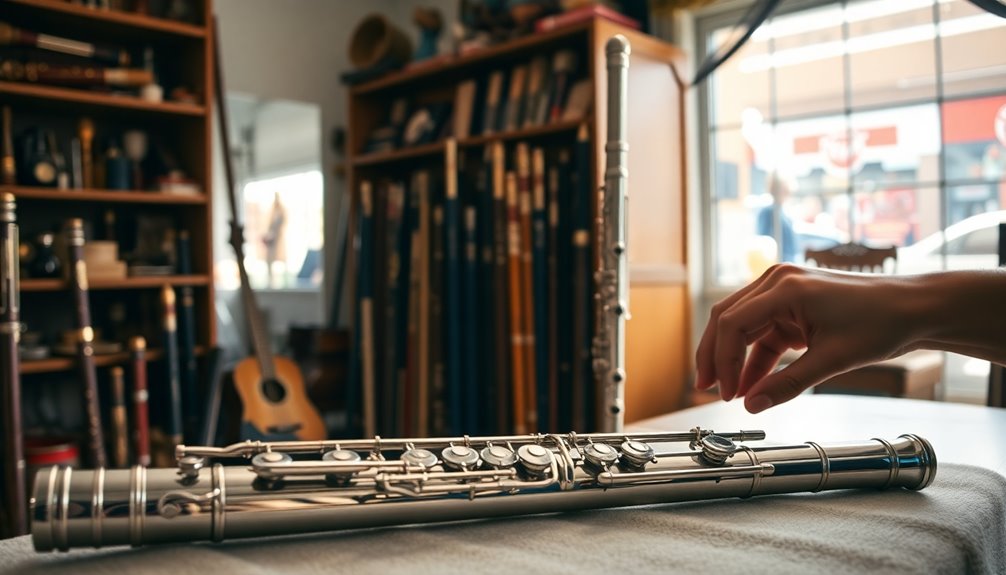
When searching for a second-hand flute, knowing where to look can greatly enhance your chances of finding the perfect instrument. Start by exploring online marketplaces like eBay and Craigslist, where you can find a variety of flutes, often at competitive prices. These platforms allow you to compare options and read seller reviews, ensuring you make an informed choice.
Local music shops are another great option. Many stores have a selection of used instruments and knowledgeable staff who can help you find a flute that fits your needs. You might even discover unique gems that aren't listed online.
Thrift stores and garage sales can be treasure troves for hidden musical instruments. While it might take some digging, the thrill of unearthing a quality flute at a bargain price can be incredibly rewarding.
Reflect on checking out classified ads in your area and joining community forums or social media groups dedicated to musicians. These platforms often have members selling their instruments, making it easier to connect with fellow musicians who understand your desire for a beautiful flute. Additionally, consider looking for flutes made from durable materials that provide longevity and quality sound.
Here are some emotional aspects to reflect on in your search:
- The excitement of finding a unique instrument that tells a story.
- The sense of belonging when connecting with other musicians through shared interests.
- The joy of making music with a flute that resonates with your personal style.
Inspecting Before You Buy
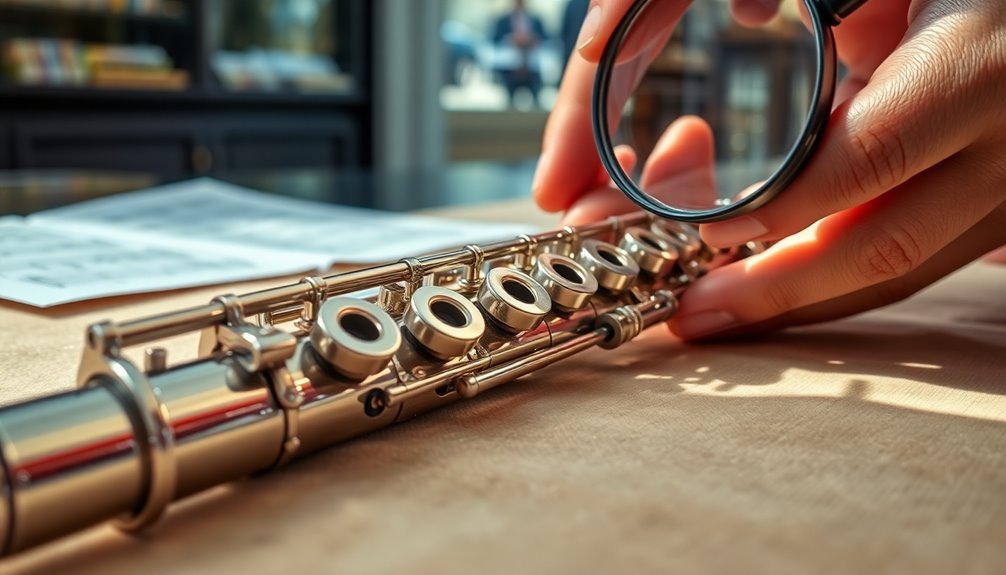
One of the most crucial steps in finding a second-hand flute is inspecting it thoroughly before you buy. A careful visual inspection can reveal a lot about the instrument's condition. Look for any noticeable scratches, dents, or signs of wear, particularly around the pads and keys. These imperfections can affect not just the flute's appearance but also its sound quality and durability.
Next, you'll want to assess the mechanical functionality of the flute. Gently press each key to verify they respond smoothly and return to their original position. Sticking keys can indicate problems that might require costly repairs.
Also, check the alignment of the pads; they should sit evenly against the tone holes when closed. Misaligned pads can lead to air leaks, impacting the flute's performance.
Don't hesitate to ask the seller questions about the instrument's history. Understanding its previous use can give you insight into how well it has been maintained. Additionally, consider factors like material quality and durability, as they significantly impact the flute's longevity and sound production.
It's important to remember that you're not just buying a flute; you're investing in a tool that will accompany you on your musical journey.
Testing the Flute
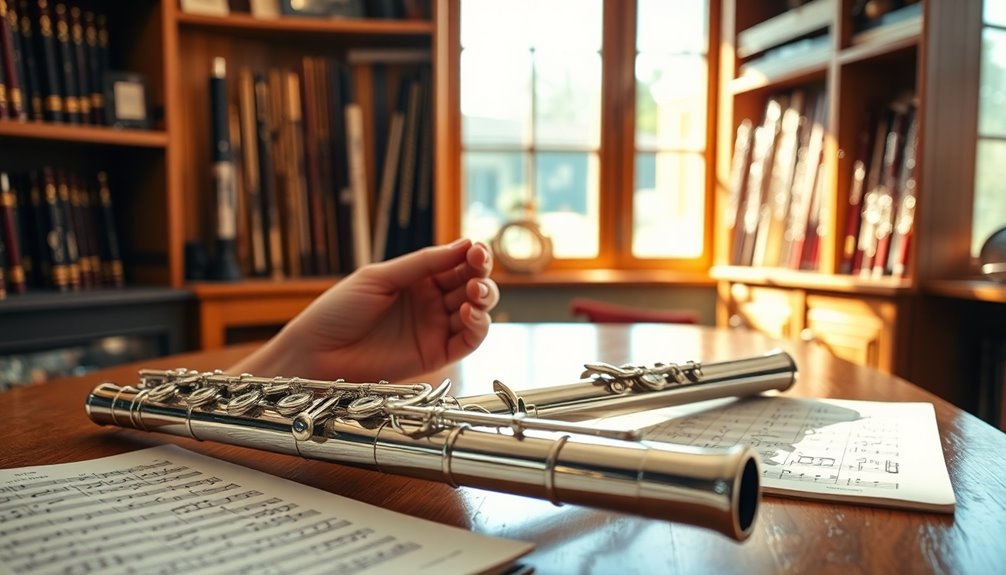
Testing a second-hand flute is essential to verify it meets your musical needs and expectations. As you commence on this journey, it's important to employ effective testing techniques that help you assess the flute's sound quality and overall playability. Here's what you should focus on:
- Tone: Listen for a rich, full-bodied sound that resonates with your musical style.
- Response: Confirm the flute responds well to your breath and fingerings, allowing for smooth shifts between notes.
- Comfort: The feel of the instrument should be inviting, making you want to play it for hours.
Start by playing long tones to evaluate the flute's intonation and consistency. Try different notes across the range, paying attention to how easily each note comes out. If the flute struggles in certain areas, it mightn't be the right fit for you.
Additionally, play scales and simple melodies to assess its responsiveness and sound quality.
Don't be afraid to bring a trusted friend or teacher along; their ears might catch nuances you miss.
Remember, finding the perfect flute is a journey, and you want an instrument that feels like an extension of yourself. It's also advisable to conduct a quick check for common issues such as sticky keys or air leaks, which can significantly affect playability.
Ultimately, this process should feel rewarding and affirming. A well-tested flute won't only sound beautiful but will also inspire you to play with confidence and joy, allowing you to connect more deeply with your music and community.
Happy testing!
Negotiating the Price
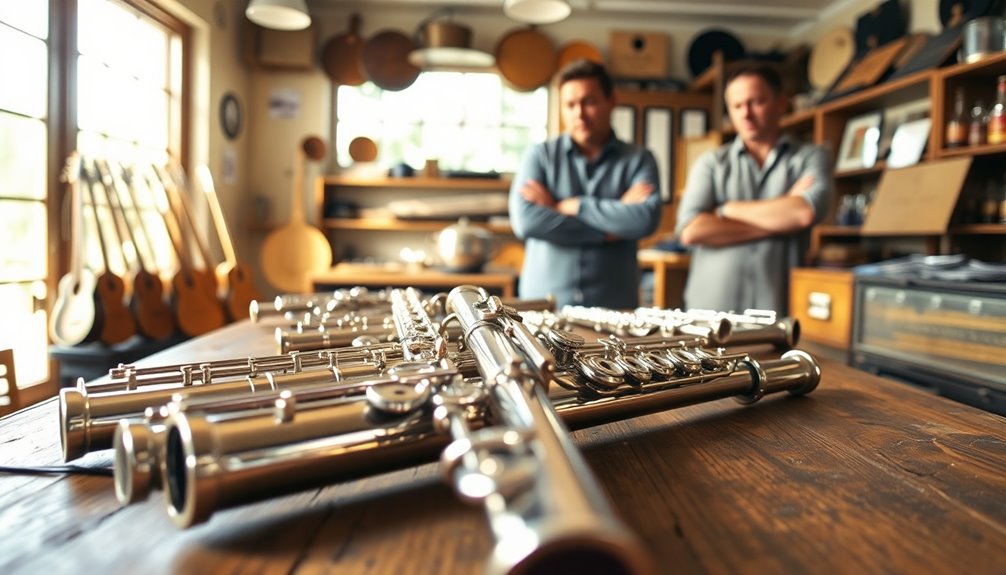
Negotiating the price of a second-hand flute can feel challenging, but it's an essential step in ensuring you get the best value for your investment. Understanding the market and employing effective bargaining tactics can make a significant difference in the final price you pay. To start, do a price comparison among similar flutes online or in local shops. This will give you a solid foundation to negotiate from.
When you approach the seller, be polite but assertive. Express your interest in the flute and mention your findings from your price comparison. You might say something like, "I noticed similar models are listed for less. Can we discuss the price?" This approach opens the door for negotiation while showing you're informed. Additionally, consider the flute's material and key system, as these factors can impact its value.
Here's a quick reference table for effective bargaining tactics:
| Bargaining Tactic | Description |
|---|---|
| Do Your Homework | Research prices and condition beforehand. |
| Be Polite | Maintain a friendly demeanor during talks. |
| Start Lower | Offer a price below what you're willing to pay. |
| Know When to Walk Away | Be prepared to leave if the price isn't right. |
Finalizing Your Purchase
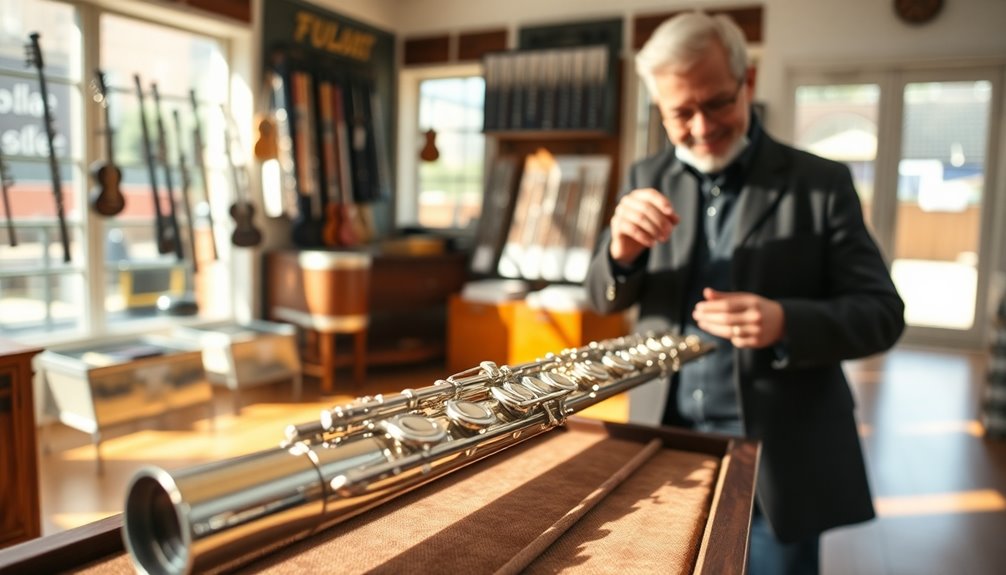
Once you've settled on a price, it's time to finalize your purchase and confirm everything is in order. This step is essential because it guarantees you're not just buying a flute, but also investing in your musical journey.
Before you seal the deal, consider a few final considerations that can affect your experience.
First, take a moment to inspect the flute one last time. Check for any dents, missing pads, or sticky keys. You want to verify that you're getting a quality instrument that will serve you well.
Next, think about the seller's reputation. Are they trustworthy? Have they been transparent throughout the process? These decision factors play a significant role in your overall satisfaction.
Here's a quick checklist to help you finalize your purchase:
- Feel the excitement of owning a new instrument that can bring you joy.
- Imagine the melodies you'll create with your flute, sharing music with others.
- Visualize your growth as a musician, becoming part of a community that shares your passion.
- Don't forget to consider investing in a flute cleaning kit to maintain your new instrument's pristine condition.
Once you've addressed these points, don't forget to ask for any necessary paperwork, like a receipt or a warranty.
Completing your purchase with clarity will help you feel confident and supported in your new adventure. Remember, you're not just buying a flute; you're stepping into a world where you can express yourself and connect with others through music.
Embrace this moment!
Frequently Asked Questions
What Are the Best Brands for Second-Hand Flutes?
When considering the best brands for second-hand flutes, you can't go wrong with Yamaha and Gemeinhardt flutes.
Yamaha flutes are known for their durability and excellent sound quality, making them a favorite among many musicians.
Gemeinhardt flutes, on the other hand, offer a warm tone and are often more affordable.
Both brands have a strong community of players, so you'll find support and resources as you begin your musical journey.
How Do I Clean a Second-Hand Flute?
Cleaning a second-hand flute's essential for maintaining its sound and longevity.
Start with basic cleaning techniques like swabbing the interior with a soft cloth after each use. For deeper cleaning, use a gentle soap solution on the exterior, avoiding pads and keys.
Regular maintenance tips include checking for moisture buildup and ensuring all pads seal properly.
With a little care, you'll keep your flute in great shape, making your music even more enjoyable!
Can I Upgrade My Second-Hand Flute Later?
Absolutely, you can upgrade your second-hand flute later!
Flute upgrades can enhance your playing experience and can greatly improve sound quality. As you progress, you might want to invest in a more advanced model or add features that enhance instrument longevity.
It's all about finding what suits your style and needs. Remember, every musician's journey is unique, and upgrading can be a part of feeling more connected to your craft and community.
Is There a Warranty on Second-Hand Flutes?
When it comes to warranties on second-hand flutes, you're often in a bit of a pickle.
Most used instruments don't come with warranty details, especially if they're older.
However, if you buy from a reputable dealer, they might offer a limited warranty based on the flute condition.
Always ask before purchasing to guarantee you're covered.
Don't hesitate to dig deeper; a little research can save you from future headaches!
How Do I Know if the Flute Is Student or Professional Level?
To determine if a flute is student or professional level, look for specific features.
Student flutes usually have simpler designs, like closed holes and a lightweight body.
In contrast, professional flutes often showcase advanced characteristics, such as options for open holes, a solid silver body, and a more intricate mechanism.
You'll feel more confident in your choice by understanding these differences, ensuring you pick an instrument that truly fits your playing style and aspirations.
Conclusion
In your quest for the perfect second-hand flute, remember that nearly 70% of musicians prefer buying used instruments for better quality and affordability. By understanding flute types, evaluating condition, and knowing where to shop, you can find a great deal that suits your needs. Don't hesitate to test and negotiate before finalizing your purchase. With a little patience and research, you'll discover a flute that not only fits your budget but also enhances your musical journey.


